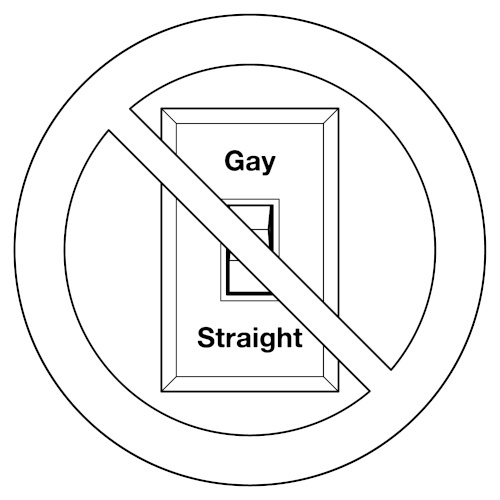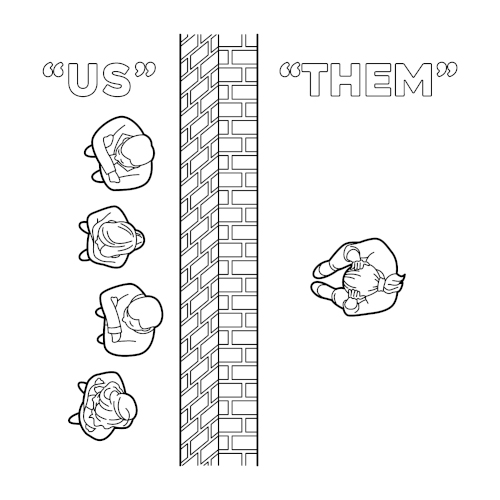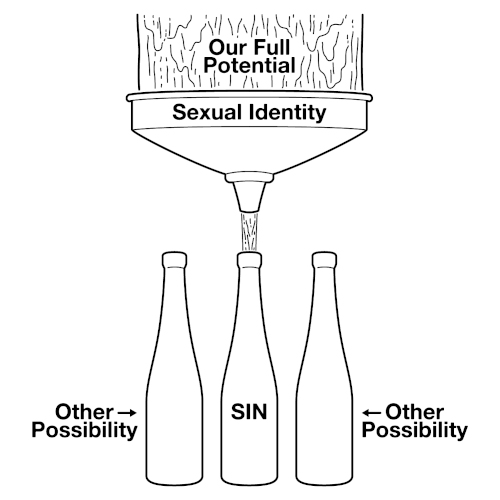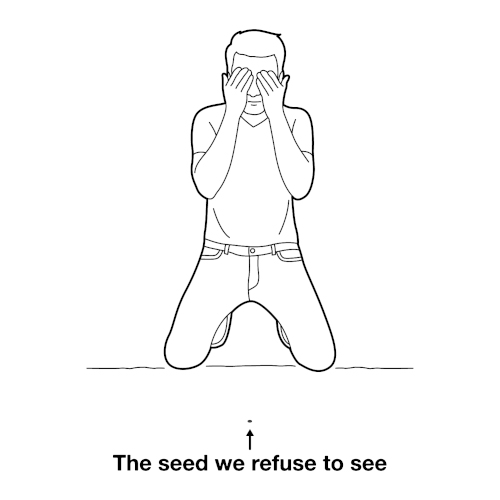Why Do We Help Make
Sin Inevitable?
How we interpret human sexuality is entirely up to us, so why do we choose to interpret it in a way that makes sin inevitable?
Who I am writing to
I write these words to those who agree with me that same-sex sexuality is morally wrong. If you believe otherwise, you are certainly welcome to continue reading, but please understand you are not the intended audience and I’m not writing this to persuade you. It is to those who agree with me about same-sex sexuality that I ask: Why do we help make sin inevitable? Because that’s what sexual identity does, yet we still continue to interpret human sexuality according to its flawed rules. Why?
Let’s make sure we understand what we’re talking about. Sometimes called sexual orientation, sexual identity segregates humans based on their sexual desires. Some of us are said to be “straight”. Some of us are said to be “gay”. Some of us are said to be “bisexual”.
But what is sexual identity really? Is it height? Is it weight? Is it blood type? DNA? No, sexual identity is nothing. We made it up. It doesn’t actually exist in the physical world. It’s just one possible interpretation of human sexuality, and we have no obligation to believe it. We made it up. It only exists because we allow it to exist, and we don’t have to allow it to exist.
Key point: Sexual identity is a social construct. We made it up. You don’t have to believe in it.
Sexual identity and its implicit “and”
I imagine some readers are confused at this point. Am I claiming that “gay” people or “bisexual” people don’t exist? Am I saying that if we just stopped believing in them, those people would disappear? Of course not. Obviously people exist who feel attraction to their own sex. I would know, for I experience that wrong desire at times myself. The people are there; they exist. The attractions are there; they exist. But how do we interpret those attractions? That is the argument I’m making here. Sexual identity, with its labels “gay”, “bisexual”, and “straight”, is just one possible interpretation.
What do the words “gay” and “bisexual” really mean anyway? Do they simply mean “someone who feels same-sex attraction”? Is it just the presence of same-sex attraction they refer to? Or is there something more they communicate? Let’s dive in and reason this together.
Brigham Young University and other religious schools require their students to follow a moral code, which is based on the religious beliefs of those schools’ sponsoring religions, and same-sex sexuality is one of the behaviors prohibited by that moral code. Some people claim this prohibition against same-sex sexuality at BYU discriminates against “gays”. In fact, given the present course of our society, BYU and similar schools are under looming threat to be forced to either abandon that rule or suffer potentially drastic consequences.
Now, let’s stop and think about this. If the word “gay” simply means “someone who feels same-sex attraction”, then another way to say that is it means “someone who desires to engage in same-sex sexuality”. Okay, so this is someone who wants to break one of BYU’s rules. Except, how is that different from any of BYU’s other rules? Surely for each rule within BYU’s moral code there exists someone who desires to break that rule. If a prohibition against same-sex sexuality discriminates against “someone who desires to engage in same-sex sexuality”, then don’t the rest of BYU’s rules discriminate against people as well? In that case, how can a school have a moral code at all, or any rules whatsoever?
What I’m getting at here is “someone who feels same-sex attraction” is not what the words “gay” and “bisexual” actually mean, or better said, that’s not their full definition. With sexual identity, there’s always an implicit “and”. Here is the actual definition of the words “gay” and “bisexual”: “Someone who feels same-sex attraction and embraces it as who they are”.
Now do you understand the claim that BYU is discriminating against “gays”? The words “gay” and “bisexual” do not indicate simply the presence of same-sex attraction, they indicate the embrace of it. In effect, people who identify as “gay” or “bisexual” are saying that same-sex attraction is the core of who they are. And so, to prohibit them from indulging that wrong desire is to prohibit them from being who they are. That’s the logic of sexual identity. That’s why schools such as BYU are under looming threat they will have to abandon their moral standards or suffer the consequences.
Let’s consider those two definitions of the words “gay” and “bisexual” again:
-
Definition A: “Someone who feels same-sex attraction.”
-
Definition B: “Someone who feels same-sex attraction and embraces it as who they are.”
Consider the enormous moral gulf between those two definitions. Sexual identity is the “and” of the latter definition. Look at the words themselves: “sexual” and “identity”. Sexual identity is the belief that we should identify with our sexual desires, that those desires should be considered the core of who we are. When you feel a desire, sexual identity expects you to embrace it. There is no right or wrong in sexual identity, there is only desire.
Our goal, therefore, is not for the people who feel same-sex attraction to disappear. Our goal is for the “and” to disappear. “To embrace” is a verb, an action—It is a choice. We want to help people make a better choice. But we cannot help them do that when we ourselves continue to use a flawed interpretation of human sexuality which demands that morally harmful “and”.
Key point: Sexual identity does not indicate only the presence of same-sex attraction, it indicates the embrace of it.
Why do we build a wall of separation?
And the embrace of sexual desire is not the only implicit “and” of sexual identity. When we call ourselves “straight” or “heterosexual”, we aren’t just saying we don’t currently feel same-sex attraction. When we call ourselves “straight” or “heterosexual”, we’re claiming that we’re fundamentally incapable of ever experiencing same-sex attraction in any possible situation. That’s the other implicit “and” of sexual identity: the myth of “born this way”. According to sexual identity, not only are we currently “gay”, “straight”, or “bisexual”, but we’ve always been that way since our birth and nothing in the meantime could have swayed us one way or the other.
In effect, sexual identity segregates humanity with gigantic walls that reach up to the sky, separating “straights” from “gays” and “bisexuals”, or in other words, separating “us” from “them”. But why? Why do we do this? Same-sex attraction is just a wrong desire like all our other wrong desires. With what other wrong desire do we feel the need to declare we are fundamentally incapable of ever experiencing that desire? Why do we need that wall of separation between “us” and “them” when it comes to this wrong desire? Are we so uncomfortable with those who struggle with this wrong desire that we’re unwilling to stand shoulder to shoulder with them or, better yet, to embrace them? How can we embrace them when we’ve deliberately placed a wall in the way?
Because that’s what we’re doing every time we call ourselves “straight” or even think of ourselves that way. We’re creating a wall that separates “us” from “them”. But why do we do that? What is it about this wrong desire that makes us feel the need to do that? I leave that question for you to ponder.
Key point: Why do we feel the need to build a wall of separation between ourselves and those who struggle with this wrong desire?
Hate the sin but love the sinner
The counsel to “hate the sin but love the sinner” is wise. It allows us to simultaneously stand for what is right while also understanding that each of us are imperfect humans and deserve love regardless of our mistakes. Yet that counsel has come under fierce attack when it comes to the sin of same-sex sexuality, and it’s sexual identity that’s to blame.
In the first place, as demonstrated above, when someone chooses to identity as “gay” or “bisexual”, they aren’t just speaking of the presence of same-sex attraction but the embrace of it. In effect, they are saying they are same-sex sexuality. Or, in other words, they are sin. But how can you hate the sin but love the sinner if the sinner is the sin? It’s an impossibility, and sexual identity made it that way. According to sexual identity, if you hate the sin of same-sex sexuality, that means you hate “gays” and “bisexuals” because, according to sexual identity, those people are that sin.
The belief that we should hate the sin but love the sinner is the direct opposite of a belief in sexual identity, which claims the sinner is the sin. These two beliefs are like matter and anti-matter. They cannot exist together.
Furthermore, our choice to build a wall of separation between “us” and “them” sends a clear message to those we consider to be “them”, and that message isn’t a message of love. We claim to love the sinner and hate the sin, yet we still feel compelled to constantly point out that this sin is only “their” sin. We cower behind this wall we created, hurling condemnation over the top of it, and we expect those on the other side to feel love from us? No, the wall we created to separate ourselves from “them” speaks loud and clear our true feelings for “them”. If we want to deliver a different message, we should tear down the wall, look them in the eyes, and share that message with them.
Key points: Our choice to build a wall of separation is not an expression of love toward those we place on the other side of that wall.
There, but for the grace of God, go I
It is far easier to hate the sin but love the sinner if we’re able to honestly see ourselves in the shoes of the sinner. If we want to be able to show love to the sinner, therefore, we need to be able to recognize “there, but for the grace of God, go I.”
That’s a remarkable statement, isn’t it? “There, but for the grace of God, go I.” Consider what it means. It’s a humbling recognition that there’s much about ourselves that’s outside our control. Furthermore, it’s a recognition that our life today could be different than it is, as well as a recognition that our future is wide open for both good and ill.
If we currently think of ourselves as “straight” or “heterosexual”, if we currently don’t recognize even a hint of the wrong desire of same-sex attraction within ourselves, then sexual identity claims we were always that way and we would always be that way regardless of our circumstances and choices. But do we really believe that? Would we believe that about any other wrong desire?
Ponder that question, and ponder how much easier it would be to “hate the sin but love the sinner” for this sin if we were able to recognize that “there, but for the grace of God, go I” when it comes to this wrong desire.
Key points: If we wish to “hate the sin but love the sinner”, we must recognize that “there, but for the grace of God, go I”.
Unrealistic expectations
Within the worldview of sexual identity, there is no escape. Those who try to escape will inevitably fail, not because their motivation to escape is an unrealistic one, but because they are working under false premises, namely they are continuing to work within the worldview of sexual identity when they should instead be rejecting the entire concept.
Sexual identity creates the illusion of a magical switch inside our brains, one side marked “gay” and the other side marked “straight” (with “bisexual” generally forgotten). Picturing this imaginary switch, we assume the solution to same-sex attraction is to figure out some way to flip the switch and change its setting from “gay” to “straight”. This leads to such concepts as “conversion therapy” and “ex-gays”, well-intentioned attempts to reject same-sex sexuality that are ultimately futile because of this simple truth: There is no switch to flip.
Attraction to one’s own sex is just a wrong desire like our countless other wrong desires. It isn’t special. It doesn’t deserve even a tenth of the attention our society has given it in recent decades. And for those who currently experience it, it’s important we all understand this truth: It will never go away. Why should it? Same-sex attraction is nothing more than a wrong desire. Do our other wrong desires ever go away? No, they don’t, not entirely. Yes, wrong desires can grow weaker and duller as we make their rejection a habit, but the wrong desire will always be there, lurking in the background, waiting to hit us in a weak moment so it can pull us down to the depths we once drowned.
The expectation that same-sex attraction will go away entirely is an unrealistic one. Furthermore, it’s an unnecessary one. Same-sex attraction is simply a wrong desire. We already know how to deal with wrong desires, and we should deal with same-sex attraction in the exact same way. The presence of same-sex attraction is not the problem and has never been the problem. It’s our interpretation of its presence that’s the problem. It’s sexual identity that’s the problem. Sexual identity is a flawed interpretation of human sexuality that falsely claims our sexual desires are who we are. It’s a trap that offers no escape.
Key point: The presence of same-sex attraction is not the problem, our interpretation of its presence is the problem.
The vicious cycle
Consider the vicious cycle that sexual identity creates. All of us who find it easy to reject the sin of same-sex sexuality place ourselves on one side of a wall we created to separate ourselves from those who struggle with that sin. We are comfortable on that side of the wall, safely separated from “them” by a wall of identity, but have we considered the effect that wall has on those we consider to be “them”?
Imagine a teenage girl who just admitted to herself she’s attracted to other girls. She knows the rules of sexual identity. If she feels same-sex attraction, she must not be “us”, she must be “them”, so she places herself on that side of the wall. Now imagine what she sees there. As she considers what her future life could look like, and as she looks around for role models she can emulate, what kind of examples will she see?
She will see a few who currently reject same-sex sexuality. However, given their belief that they are rejecting a core part of who they are, how many of them will seem happy to her?
She will see some who attempt to scale the wall to escape to the other side, and she will watch as they all inevitably fall back down to the ground, hurting themselves in the process.
But the majority of the people she will see on that side of the wall will be those who have chosen to engage in same-sex sexuality and to enter into same-sex relationships.
And what about the rest of us and the lives we are living? We are marrying, having kids, raising families, working hard, living happily. Will she look to any of us as a role model of what her life could be like? No, because when she looks in our direction the only thing she will see is a wall—the wall we ourselves created.
And so, seeing no other good options presented to her, she will embrace same-sex attraction like everyone else she sees around her, and sooner or later she will choose to indulge it. Because, according to sexual identity, that’s who she is. According to sexual identity, she is sin. Within the rules of sexual identity, there is no other choice available to her, no escape.
And then another teenage girl finds herself in the same situation, or another teenage boy, each following in the footsteps of the one before, a vicious cycle that can never be broken so long as we continue to interpret human sexuality according to the flawed rules of sexual identity.
Key point: When we place a wall of separation between ourselves and others, we prevent them from viewing us as a role model they can emulate. Instead, they are forced to model their lives after the examples set by everyone else on the other side of the wall we created.
Sexual identity inevitably leads to sin
Which leads me back to my original question: Why do we help make sin inevitable? Because that’s exactly what sexual identity does. When people identity as “gay”, they are placing same-sex attraction as the core of who they are and they are placing everything else outside of it. And there in their center this wrong desire will act like a magnet, attracting everything that supports it while repelling everything that discourages it. That’s why it’s so unfortunate when someone who believes same-sex sexuality is wrong nevertheless chooses to identity as “gay”. When they do so, they are placing a wrong desire inside their core, which will inevitably repel their belief that the desire is wrong, and eventually they will fall.
Think of your “favorite” vice, an action you know is a sin yet nevertheless feel the desire to commit. You fight against it, perhaps daily, yet you know it’s wrong and you try your best to resist it. Now imagine you embraced that sin as part of who you are. What would inevitably happen?
Oh, I still think it’s wrong, of course I do, but it’s who I am, and it’s really, really hard to reject part of who I am, and am I being true to myself when I do? You don’t understand, how could you? You aren’t like me. It’s wrong of course. It’s a sin of course. But it doesn’t really seem fair that I’m the only one that has to struggle with this. It’s so much easier for you. You don’t even feel the desire! It doesn’t seem fair. And it’s not fair that I have to deny something that’s part of who I am. You aren’t asked to do that. Why am I expected to? Does that mean God doesn’t love me? No, that can’t be it, because God is love, so of course He loves me, but how can He love me if He doesn’t accept me, and how can He accept me if He doesn’t accept this desire that’s part of me, so of course He accepts it because it’s part of who I am and God loves me and wants me to be who I am.
And so, the next time a fellow believer tells you they’re “gay” and you immediately wonder if they’re talking about just feeling same-sex attraction yet rejecting it or if they’re talking about actually acting on that attraction, understand that the question is a moot one because they’ve already chosen to start down a path that has only one inevitable destination. Now or later, they’re going to give in. It’s only a matter of time. Because that’s exactly what sexual identity is meant to do. If you embrace a wrong desire as a core part of yourself, eventually you’ll rationalize a way to justify indulging that desire.
It’s tragic because it doesn’t have to be like this, but sexual identity blinds us to all other possibilities. Yes, sin was always a possibility, but with sexual identity, sin becomes the only possibility. So why do we go along with it? Why do we continue to think and to talk in ways that remove all other choices from people except sin? There are so many different ways to live, so many different ways to find meaning and happiness in life if we would only open our minds and look for them. No one is forced to choose between only sin or misery. If it seems that way, it’s because we’ve chosen to blind ourselves to the other possibilities.
If someone wishes to engage in same-sex sexuality, then it makes sense for them to champion sexual identity because they can use it as a weapon. “You can’t love me unless you accept my same-sex sexuality!” “If you reject same-sex sexuality, you’re discriminating against me!” But it makes zero sense for those of us who believe same-sex sexuality is wrong to play along. Yes, others can label themselves however they want, but we don’t have to encourage or support that choice. We don’t have to accept sexual identity, and we can try to persuade others to reject it as well.
Key point: If someone embraces a wrong desire as part of who they are, they will eventually decide to indulge that desire. That is their choice to make, but we shouldn’t be encouraging that decision.
The seed we refuse to see
Yet we cannot truly reject sexual identity until we comprehend there is no “us” and “them”, and we will not truly comprehend that until we allow ourselves to see the seed of this wrong desire within ourselves. For many of us the seed of this wrong desire has actually sprouted into an ugly weed—perhaps small, perhaps large, regardless, it’s there and we must contend with it—but even if there isn’t even a trace of that weed within us, its seed is still there; for the seeds of all desires, whether right or wrong, reside within all of us; and given the necessary conditions, those seeds will grow, for good or ill.
We admit this to ourselves about so many other wrong desires. Why not this one? Think of a poverty-stricken, war-torn, violence-ridden country and all the wrongs committed there and the awful desires that have sprouted within the hearts of some of its inhabitants. Are those people fundamentally different from us? Are those horrible desires they feel and we don’t feel explained by genetics? Are they a separate sub-species from us? No, they are us and we are them. It is the circumstances and choices of their lives that has led them to that tragic state—and those same circumstances could lead us there as well if we let them. The seeds of wrong desires, of all wrong desires, are within us all—and that includes the wrong desire of same-sex attraction.
And once we finally admit that to ourselves, we will finally be able to say “there, but for the grace of God, go I”, we will finally be able to comprehend there is no “us” and “them”, we will finally be willing to tear down the wall of separation that sexual identity creates, and then we will be able to embrace those who struggle, and we’ll be in a position to help them—because if things were different, we could be in their shoes and they could be in our shoes, and now we finally understand.
And with this new understanding, how can we continue to use the flawed concept of sexual identity? If we continue to call ourselves “straight” or “heterosexual”, we are lying and we know we are lying because those words claim we are fundamentally incapable of ever experiencing same-sex attraction; and, seeing the seed of wrong desire within ourselves, we know that’s absolutely not true. There is no wall of separation. We’ve torn it down. There is no “us” and “them”. There is only we.
Key Point: The seeds of all desires, both right and wrong, lie within us all. Admitting this about a wrong desire allows us to truly say “there, but for the grace of God, go I” and to be in a position to help those who struggle.
Why this matters
You don’t have to believe in sexual identity. You don’t have to interpret human sexuality according to its morality-destroying rules. When you are asked what your sexual identity is, when you are asked if you are “gay” or “straight”, you don’t have to answer. You can reject the premise of the question.
Sexual identity isn’t part of provable reality. It isn’t based on empirical evidence. It is at best only an interpretation of that evidence, and you aren’t obligated to accept that interpretation. Why would you want to interpret human sexuality according to the rules of sexual identity? Isn’t it obvious how inaccurate it is? It’s not something like blood type, height, or weight. It’s not something you can actually measure and objectively determine. Everyone’s sexual identity is based simply on their own personal judgment, and there is no guarantee that that personal judgment is uniform or even accurate. Millions of people identify as “gay”. Do you honestly believe that each and every one of them feels zero opposite-sex attraction? I don’t believe that. Millions of people identity as “straight”. Do you honestly believe that each and every one of them feels zero same-sex attraction? I don’t believe that for a second. Yet that is what you’re expected to believe when you believe in sexual identity. Furthermore, you’re expected to believe we were “born this way”, you’re expected to believe that “gays” and “straights” are fundamentally different, that they’re essentially separate sub-species with non-overlapping capacities for sexual desire. It’s a ridiculous belief that goes against experiential reality if you will only open your eyes and look around you and if you will only look inside yourself and be brave enough to see the seed of wrong desire that resides there just as it does in everyone else.
Not only is sexual identity inaccurate, it’s also morally damaging. It’s damaging to those who struggle against wrong desires, and it’s damaging to the moral fabric of society itself. Sexual identity is inherently anti-moral. It claims that whenever we feel a desire, that desire is part of who we are and we should indulge it. This is utterly toxic to morality, and its logical conclusion, which I explored in my novel The River Is Always Waiting, is horrifying. Why would you willingly continue to interpret human sexuality in such a terrible way?
When a game is rigged against you, the only way to win is to not play. And sexual identity is rigged against you. It’s rigged against everyone who believes some desires are wrong. Because within the world of sexual identity, there is no right or wrong. Within the world of sexual identity, there is no good or evil. Within the world of sexual identity, there is only desire. And where there is desire, sexual identity demands it be embraced.
Imagine what would happen if you stopped playing this rigged game. Imagine what would happen if we all stopped playing it. Imagine what would happen next.
The Twin Lies of Our Day: Gender Identity and Sexual Identity
Get Ebook:







